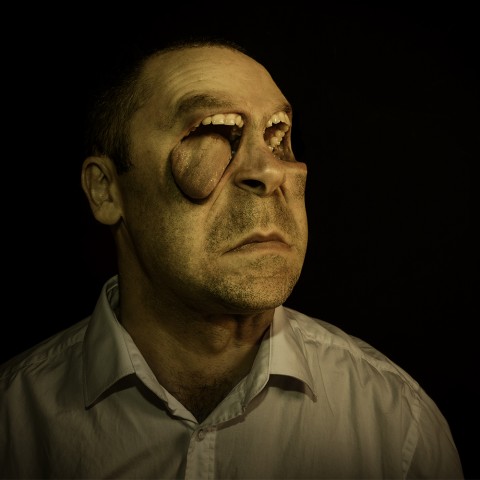You know those little cities I told you about last night. Those tiny little cities. They’re the size of pins or smaller, they’re long and thin like pins. They rise up on each of our discarded hairs, our forsaken hairs, skyscrapers growing from our abandoned hairs. You with your giant workboots and your giant, clodding feet, you should watch your step. You’ll crush these cities and everyone in them; you’ve surely crushed a hundred already. But listen: Like our full-sized city, the tiny ones are cloudy in the morning, cold. They grow, faster than ours, faster than you can imagine. Cars pack their long main road, towers build, build up. Their kitchens are surprisingly nice, though like us, they barely use them. In those small cities, they have bags that appear to be empty, barren pots and pans, bowls filled complete with air. If a person like you or I stuck a hand like yours or mine, but much much smaller, into one of those magic bags and announced what we wanted to eat, we’d suddenly pull out a plate of pure gold, suddenly smell the strong deep smell of food suddenly there, and we’d eat, and it would fill us up, buttery and spiced and rye. If someone like us, but smaller, recited the right words over the right pot or pan, if we chanted the simple chant, cakes and rice and cakes of rice would pile up before us. If we asked one of their empty bowls for porridge, porridge would start shimmering and bubbling from the bottom and keep bubbling until it seeped over onto the floor. In the small cities, their bags say gtgtgt and sound like children burping; their bowls say rfrfrf and sound like purring kittens; their pots and pans say jmjmjm and sound like carts wobbling down a steep hill. Other than the threat of being crushed by feet like yours, all should be well in these small cities. There should be places anyone can go with a wooden bowl and a ragged spoon and a stale piece of bread and eat food conjured by wizards and jinn. But listen: the tiny humans that own these things, the ones who know how to use them, who know the right words, they’re demons. Their fingers slick with grease. Pots and pans, they chant, pots and pans, and they clap their hands, they clap their hands. They throw whatever they don’t eat into piles where it mixes with the garbage, and it spoils, pools of gravies turning green. Their microscopic pigeons circle and land won’t even peck at it. Minute rats wrinkle their noses and scurry on. And the tall buildings keep rising, their long hallways growing deeper. And at the end of each, of course, is suffering, and suffering waits behind almost every door. We suffer in our city because we have no magic and hope for it; they suffer because it’s everywhere and it still doesn’t make things a whole lot better. And listen, listen: You talk about how this story is making you hungry, how it’s time to get up against the cold and shower and dress and go order some biscuits and honey and pancakes and eggs. You’re a clumsy man, such a clumsy man. You refuse to see what’s under your heel. But it is comfortable here, and warm. The sun is along the shades now. The clouds disperse. Outside, the city, our large city, our humungous city, honks and moves, honks and moves. Inside, tiny cities climb above the dust in corners; and demons feast in them, the smell of their food floating into desperate hallways and hovering over deserted parks, becoming sick and stale and rotten, and fading away by midnight.

Notes from Guest Reader Christopher Allen
Such a strong and urgent voice. Each time I read this I find some new magic.


 The core workshop of SmokeLong Fitness is all in writing, so you can take part from anywhere at anytime. We are excited about creating a supportive, consistent and structured environment for flash writers to work on their craft in a community. We are thrilled and proud to say that our workshop participants have won, placed, or been listed in every major flash competition. Community works.
The core workshop of SmokeLong Fitness is all in writing, so you can take part from anywhere at anytime. We are excited about creating a supportive, consistent and structured environment for flash writers to work on their craft in a community. We are thrilled and proud to say that our workshop participants have won, placed, or been listed in every major flash competition. Community works.